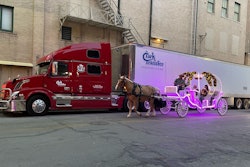My first job out of high school was installing fire and burglar alarms.
Hold on. Let me back that up. I wasn't actually installing them. I was doing all the crap-work that went into the installation process so that someone else could actually install it.
I was an apprentice: a fancy word for do-boy.
When we pulled up to a house with a crawl space, my "trainer" would check the underside of the house with his flashlight. If he saw any signs of a leak (or spiders), it was my job to crawl under there to run wire and punch holes so he could connect the wires from the comfort of inside. Ditto for homes with an attic. I've lived in the south my entire life. I'm well versed in heat, humidity and being hot. But there is no hot like the hot of an Alabama attic in August. It's like sitting in an oven. On the surface of the sun. In Hell.
I lost 15 pounds in my first week and I don't even want to think about what kind of toilet/shower/sink goo I washed out of my hair. I was an expert at convincing myself that all those leaky pipes were just water, regardless of how not-like-water it smelled.
I was 17, didn't know any better and I didn't care.
I hit overtime on Wednesday afternoon and my paychecks were fat (for a kid with no real expenses). I was living the dream – for about a month. Spiders and crawlspaces were getting old (and gross). Attics were getting hotter, and the stuff I was told to do was getting more beneath the guy who was supposed to be training me. (One time in a restaurant he had me punch a hole in a cinder block wall for a fire alarm wire right above a griddle while the griddle was on). About six weeks into the job I realized that I hadn't learned a damn thing, and 6 weeks after that I enrolled in college – a place I said I wasn't going.
I didn't mind the physical nature of the work and I expected to do plenty of the menial and "go get me a screwdriver" type jobs. Work's not supposed to be fun. If it was they'd call it fun, not work. But I'd become frightened by the fact that my entire future with this company hinged on a guy who had no incentive to lose his grunt by telling our boss that I was ready for the next phase of training, because I wasn't.
Once – and only once – the company assigned me a van and sent me out on my own to pre-wire a house that was under construction. Every job I'd had to that point was in a finished home. If I didn't know where the master bedroom was, I'd ask the homeowner. As an adult in my 40s, I now understand how to walk into a house that's only been framed and determine which room is a master bedroom or guest bedroom, or which is a kitchen or a bathroom, based on the plumbing fixtures, room size and proximity to a bathroom. As an unskilled and untrained teenager this was all foreign to me.
I was handed van keys and a work order of chicken-scratched jargon that didn't mean anything to me. All I knew was that I was supposed to run wires to rooms that I had no idea where they were so they could be found by the install crew post-construction. I wasted hundreds of feet of wire. The boss went by the house the following day to inspect my work and ripped the entire thing out. I used the correct type of wire for all the runs I was trying to make (my lone highlight), but I ran them all to the wrong rooms, or the wrong places in the correct rooms, and I was tucked neatly back under the wing of my trainer for more training.
That's not an apprenticeship. It's lazy, and it undoes the very thing apprenticeships are designed to do: bring people into your industry. I didn't grow up dreaming of being an alarm technician but I did like working with electricity and I didn't want to go school. This seemed like a good starting place for what I assume might have led to a career as an electrician. Instead of pulling me deeper into the trade, the apprenticeship kicked me out entirely because it was a complete waste of time for everyone involved and a waste of money for the company that hired me.
Apprenticeships have played an important role in the development of the trucking labor force for generations in all aspects of the industry. A survey conducted this year by CCJ, in partnership with Shell Lubricant Solutions, found that 44% of diesel technicians came to the industry via apprenticeship. One percent of our respondents were actually a current apprentice.
The Federal Motor Carrier Safety Administration just kicked off its Safe Driver Apprenticeship Pilot Program, a combined effort with the Department of Labor that acts on the 2021 Bipartisan Infrastructure Law's mandate to explore allowing younger drivers to operate interstate. The Biden administration as a whole has targeted apprenticeships to boost trucking employment among many groups including women and military veterans.
These programs should be renamed trainerships because the apprentice is the least important cog in this wheel. Of course you need the right kind of applicant – one with a willingness to learn, and maybe deal with some degree of entry level grunt work – but the path to success winds through the trainer and the company's processes.
Before jumping into an apprenticeship with both feet – even if you already have one – it's good to evaluate your processes. Is the apprentice the only one with incentive to successfully complete the training? If so, it's set up to fail. Are there checks and follow-ups all along the way? How does the apprentice move from Stage 1 to Stage 2 and so on? Does the trainer have any skin in the game? Have you ever interviewed the people who completed (or even quit) an apprenticeship and asked them where it lacked or how it could have been better?
If they would have asked when I offered my notice, I would have told them that after almost four months on the job I didn't know how to do anything that I didn't already know how to do before I started: drill hole; insert wire; and await further instruction. The company had invested a lot of money into me but invested zero thought into the process of my training and no time into its execution. The end result was chasing a willing entrant out of an entire industry and a negative return on their investment.
My problem 25 years ago was that we didn't really have a process. Our boss' primary concern was whether or not we filled all our work orders that day. If we did, that was a good day. There was no emphasis placed on teaching me anything. My trainer was a nice enough guy, except he always called me Junior. He was a fine technician but he was a lousy teacher, and he needed to be good at both.











